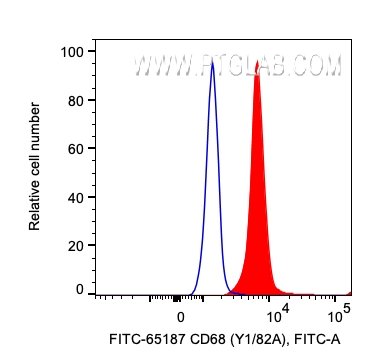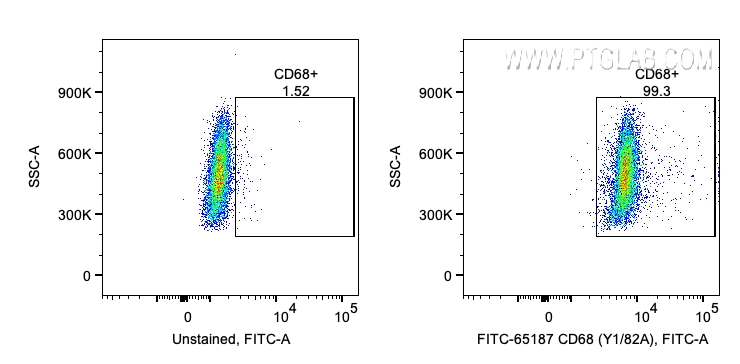验证数据展示
经过测试的应用
| Positive FC (Intra) detected in | human PBMCs |
推荐稀释比
| 应用 | 推荐稀释比 |
|---|---|
| Flow Cytometry (FC) (INTRA) | FC (INTRA) : 5 ul per 10^6 cells in 100 μl suspension |
| This reagent has been pre-titrated and tested for flow cytometric analysis. The suggested use of this reagent is 5 μl per 10^6 cells in a 100 µl suspension or 5 μl per 100 µl of whole blood. | |
| Sample-dependent, Check data in validation data gallery. | |
发表文章中的应用
| IF | See 1 publications below |
产品信息
FITC-65187 targets CD68 in IF, FC (Intra) applications and shows reactivity with human samples.
| 经测试应用 | FC (Intra) Application Description |
| 文献引用应用 | IF |
| 经测试反应性 | human |
| 文献引用反应性 | human |
| 免疫原 |
Lysosomal contents of lung macrophages 种属同源性预测 |
| 宿主/亚型 | Mouse / IgG2b, kappa |
| 抗体类别 | Monoclonal |
| 产品类型 | Antibody |
| 全称 | CD68 molecule |
| 别名 | CD68 molecule, GP110, Macrosialin, SCARD1, Y1/82A |
| 计算分子量 | 37 kDa |
| GenBank蛋白编号 | BC015557 |
| 基因名称 | CD68 |
| Gene ID (NCBI) | 968 |
| RRID | AB_2924123 |
| 偶联类型 | FITC Plus Fluorescent Dye |
| 最大激发/发射波长 | 495 nm / 524 nm |
| 形式 | Liquid |
| 纯化方式 | Purified by protein-A affinity chromatography |
| UNIPROT ID | P34810 |
| 储存缓冲液 | PBS with 0.09% sodium azide and 0.5% BSA, pH 7.3. |
| 储存条件 | Store at 2-8°C. Avoid exposure to light. Stable for one year after shipment. |
背景介绍
CD68 is a type I transmembrane glycoprotein that is highly expressed by human monocytes and tissue macrophages. It belongs to the lysosomal/endosomal-associated membrane glycoprotein (LAMP) family and primarily localizes to lysosomes and endosomes with a smaller fraction circulating to the cell surface. CD68 is also a member of the scavenger receptor family. It may play a role in phagocytic activities of tissue macrophages.



